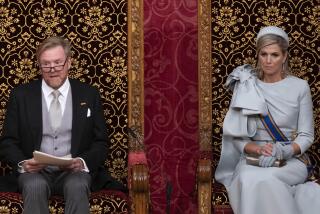Words of Hope, Not of Revenge : Mandela foresees an inclusive government
Nelson Mandela joyfully anticipates his presidency without rancor, reassuring a world weary of intractable conflicts that the newly democratic South Africa will have room for everyone. There will be no oppression of the minority by the majority, he promises. There will be no punishment for centuries of stolen land and vile inequities. There will be no purges.
Judging from interviews he gave to reporters, when Mandela takes office next week he won’t follow the politician’s traditional credo: To the victor goes the spoils. He won’t unfairly favor his African National Congress, he indicates. Instead, he promises to fashion a national unity Cabinet that includes former political rivals.
President Frederik W. de Klerk, who graciously conceded on Monday, is expected to become one of Mandela’s deputy presidents by virtue of the National Party’s impressive showing in the recent elections. The National Party, the white minority party that crafted the wicked apartheid system that legalized racial discrimination, was second in last week’s voting.
Mandela even extends his hand to his fiercest rivals--right-wing conservatives and supporters of Chief Mangosuthu Gatsha Buthelezi’s Zulu-based Inkatha Freedom Party. Despite the threats of violence by white extremists and the thousands of South Africans killed in clashes between ANC and Inkatha supporters, elements of the right too belong in the new government--not festering outside of the process.
A different kind of man would be bitter. Mandela, the lawyer and freedom fighter, lost 27 years of his life in prison. Locked away from family and friends during what should have been his most productive period, he continued to struggle against a vicious system that rationed the riches of his country on the basis of race.
Despite the historic election that has vaulted Mandela to the presidency, the majority of black South Africans still live in abject poverty. They own no land. They lack decent housing. For millions, the brutality of apartheid has not eased.
A different kind of man would insist on revenge: Someone would pay for the years of privilege at the expense of blacks. But Mandela’s words are those of hope, optimism and pragmatism. The nation’s first black president appears poised to develop the promise of the world’s newest democracy for all South Africans. There is, of course, no assurance that when Mandela is gone whoever succeeds him as national leader will possess this special vision and humanity. But for now, he is setting a remarkable standard, day by day, that will challenge the constructive energies of those who follow in his wake.
More to Read
Sign up for Essential California
The most important California stories and recommendations in your inbox every morning.
You may occasionally receive promotional content from the Los Angeles Times.










